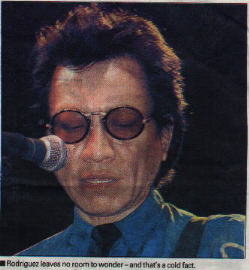Rodriguez - The Myths and The Mystery
"...a fresh breeze of honesty and openness..."
|
Home |

Southern Suburbs Tatler (Cape Town), Thursday 12th March 1998Ageless appeal of veteran
singer 
Popular Mexican-American singer Sixto Rodriguez's music has what it takes to calm and arouse the anger of the youth in any generation, said supporters, ranging from 15 to 50 years, who came to the Velodrome in Bellville at the weekend in their hundreds to see him appear live for the firstĚtime in 18 years. Rodriguez has enjoyed a steady following since the release of his cult album Cold Fact in the early 70s and the news of his appearance in South Africa was met with a sense of amazement and disbelief because of nunours that he was dead, blind and/or imprisioned. The 25-year mystery ended with his apprearance in front of about 2 000 fans on Friday and Saturday night. But why the huge attraction, especially by much younger fans, for the music of a 50-year old artist whose debut album was released in South Africa in 1971? Said 22-year-old Helen Mowatt: "He is such a down-to-earth artist appealling to everyone with his fresh and direct approach to issues of life". "I think his anti-establishment lyrics does strike a chord with the youth and their ideals." Jan du Plessis said he was around when "Sugarman" and "I wonder" were the lyrics of the day. He says Rodriquez's music was a fresh breeze of honesty and openness in those oppressive apartheid years in the 70s. For Ilse Schmidt his music was relevant because it co-incided with the hippie-era and she described it as striking social statements about peace, living, loving, controversy and the establishment. "Rodriguez's music made us calm. It was like a tonic for the National Party inflicted heartburn", Willem Naude said. According to another fan, Krishna Vallabh, his music consists of "beautiful ballads of life, where the strong and uncompromising social content brings out the global anti-establishment feeling that exists in all of us." "Rodriguez's music changed my perspective on life. And I could identify with what he was singing about because I also lived on the streets, battled with poverty and was confronted by drugs, violence and booze just like he did," said Roland Jethro. |
|
[ News | Introduction | The Man | The Myths | The Music | The Magic | The Memories ]

